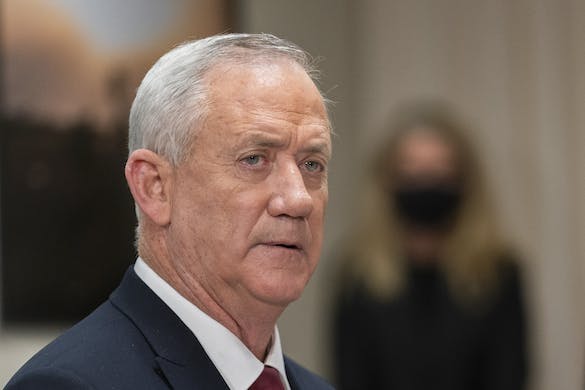Satellite Images in Hand, Israel’s Defense Minister Says Iran Is ‘Basing Itself’ in Red Sea
‘In the last months, we have identified the most significant Iranian military presence in the area in the past decade.’

Israel’s defense minister, Benny Gantz, told a high-powered international affairs forum at Athens today that Iranian warships have been actively patrolling the Red Sea. Speaking at the 26th Annual Economist Government Roundtable, Mr. Gantz said: “Today, we can confirm that Iran is methodically basing itself in the Red Sea, with war ships patrolling the southern region.”
He added: “In the last months, we have identified the most significant Iranian military presence in the area in the past decade.” To back up his claim, Mr. Gantz showed satellite images of four Iranian warships patrolling in the Red Sea, apparently in recent months.
Mr. Gantz called the Iranian patrols a “direct threat to international trade, energy supply, and the global economy. It is also a direct threat to peace and stability in the maritime arena, which may affect the Mediterranean and beyond.”
What exactly Iranian navy ships are up to in the Red Sea may not be known, or if it is known to the Israeli authorities Mr. Gantz did not specify. In his remarks today, delivered at a resort along the Athenian coast, he did say that over the past year “Iran has seized international tankers and attacked vessels.” In May, Iran seized two Greek tankers in the Persian Gulf, risking a diplomatic crisis between Athens and Tehran.
Mr. Gantz also called out Iran’s recent satellite launcher test. According to a readout of his remarks issued by Israel’s government press office, the defense minister said: “A week ago, Iran conducted yet another test of a satellite launcher from Semnan province. This test demonstrates that the Iranian regime has the capabilities to develop intercontinental ballistic missiles that may reach as far as the center of Europe.” He added that “this is in addition to operational ballistic systems and UAVs that can already reach the East Med.”
While it is Iran and its Middle East proxies like Hezbollah that pose the most immediate security challenges to Israel, Mr. Gantz acknowledged that “the consequences of geopolitical chaos, project way beyond physical borders,” saying that “the war in Ukraine has a butterfly effect — first for those who are directly involved, but also for the refugee who crosses to Poland, for the driver in Tennessee paying for gas, and for the mother in Lebanon, who must scramble to feed her children.”
Israel’s outgoing ambassador to Greece, Yossi Amrani, said recently that no country should outsource its security, and at Athens today Mr. Gantz echoed that sentiment. “As the war in Ukraine rages on, we learn that each country must be able to defend itself. Each country must plan ahead, investing in force build-up and coordinating between the strategic and operational levels,” he said.
With a litany of top security and defense officials in attendance at the seaside summer parley, including a former secretary of state, Mike Pompeo, the ministers of defense of Greece and Cyprus, and even a video call from Ukraine’s president, the talk from the Israeli defense chief was characteristically terse and to the point. “Unfortunately, Israel has faced wars since the day of her establishment,” he said. “Today, we see that war is a possibility — everywhere.”

